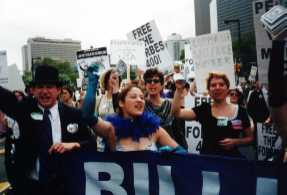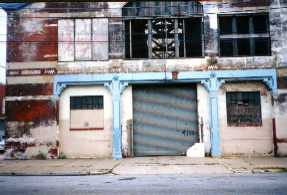|
Back to On the Road with John Tarleton
Government Crackdown on RNC Protesters Falters in Philadelphia Courts
By John Tarleton The City of Philadelphia's legal battle against activists who were arrested during protests at the Republican National Convention continues to falter as wave after wave of charges are dropped due to dismissals, acquittals or lack of evidence. Misdemeanor trials began November 8 and by mid-December courts had returned convictions in only 12 out of 147 cases. "I think it's wonderful that people are being vindicated," said Kris Hermes of the R2K Legal Collective, which is spearheading the protesters' legal defense. "We always knew that the District Attorney had no leg to stand on."
"This Was a Witch Hunt"Over 400 people were arrested during the Republican Convention, most of them on August 1 when thousands of roving protesters flooded the streets of downtown Philadelphia at rush hour in an unpermitted protest against the criminal justice system.
"This was a witch hunt," said Paul Hetznecker, a lawyer representing a number of activists arrested during the convention. "It was an attempt to suppress free speech so that George Bush's coronation could go forward without any disruption to the Republican Convention or the City of Philadelphia." Since the protests, defense lawyers have focused on police misconduct such as preemptive arrest, absence of probable cause, unlawful search and seizure, selective prosecution, prior restraint of free speech and destruction of evidence. The City of Philadelphia responded by offering a plea bargain arrangement in which those charged with misdemeanors would pay $335 in court costs and serve six months unsupervised probation at the end of which their criminal records would be expunged. Almost 200 of the defendants chose instead to practice "jail solidarity", a controversial tactic in which activists try to tie up the courts by demanding jury trials.
Danger ZoneMisdemeanor trials are scheduled to continue through January. 18 people still face felony trials in the spring, including Kate Sorenson of Philadelphia ACT UP. Sorenson, 38, played a key role last year in pressuring the Clinton Administration to back the sale of low-cost medicines to AIDS ravaged African nations. Arrested with cell phone in hand during the August 1 demonstration, Sorenson now faces up to 30 years in prison for "risking a catastrophe", "riot" and "criminal mischief". "We're still fighting fervently in the area of people being singled out for higher charges," Hermes said. "…This is the danger zone." Cathy Abookire, spokeswoman for Philadelphia District Attorney Lynne Abraham, said the city would continue to prosecute on a case-by-case basis. "You follow the facts and the evidence," Abookire said. "And, you do what's appropriate." The R2K Legal Collective (www.r2kphilly.org) has a staff of 10 full-time volunteers working 60 hours per week and 10-20 part-time volunteers. It has raised $85,000 in donations and is projecting $210,000 in expenses. Before all the criminal cases are resolved, R2K Legal anticipates filing class action lawsuits against the city for the violation of protesters' Constitutional rights. "We're looking at millions (of dollars)," said Bill Beckler of R2K Legal. "The city is probably freaking."
The PuppetistasActivists also look forward to using the discovery process to unearth more information about the methods, locations and identities of police infiltrators as well as the relationship that existed between federal, state and local police agencies. The Philadelphia Police Department is prohibited by law from infiltrating activist organizations. "We hope to uncover all the conspiracies that were allayed against us," Beckler said. "…The police have given us the bare minimum (of information). It's been like pulling teeth."
The four undercover state troopers who infiltrated the warehouse disguised as union carpenters and filed the affidavit have since been unable to identify the puppetistas in police line-ups. Judge James DeLeon tossed out all charges against 31 puppetistas on December 7. Charges against 33 remaining puppetistas were dismissed on December 13. "You can't just arrest them all and sort it out later," DeLeon said. NOTE: John Tarleton covered the protests at the Republican Convention for the Philadelphia Independent Media Center. Back to Busted Puppets: Philly Police Arrest Puppetistas; Toss Their Art into the Trash |
 309 people were charged with misdemeanors and 42 more were hit with felony charges. Alleged "ringleaders" were assessed bails as high as $1 million. Reports of beatings as well as protesters being denied water, medical treatment and access to lawyers came pouring out of the city jail. All told, protesters faced over 1,500 separate charges and centuries of possible jail time. The "Cradle of Liberty" had become ground zero in a government crackdown on dissent.
309 people were charged with misdemeanors and 42 more were hit with felony charges. Alleged "ringleaders" were assessed bails as high as $1 million. Reports of beatings as well as protesters being denied water, medical treatment and access to lawyers came pouring out of the city jail. All told, protesters faced over 1,500 separate charges and centuries of possible jail time. The "Cradle of Liberty" had become ground zero in a government crackdown on dissent.
 Perhaps the most controversial case is that of the 75 "puppetistas" who were raided at a West Philadelphia warehouse on the afternoon of August 1. Hauled off to jail and their artwork subsequently destroyed (see related story) by police, the puppetistas were slapped with as many as nine misdemeanors each (including "obstructing a highway") and bails starting at $15,000 each. Much of the 21-page affidavit that was the basis for the search warrant in the raid was based on a report by the Maldon Institute, an obscure right wing think tank that claimed the puppetistas were financed by front groups with ties to the former Soviet Union.
Perhaps the most controversial case is that of the 75 "puppetistas" who were raided at a West Philadelphia warehouse on the afternoon of August 1. Hauled off to jail and their artwork subsequently destroyed (see related story) by police, the puppetistas were slapped with as many as nine misdemeanors each (including "obstructing a highway") and bails starting at $15,000 each. Much of the 21-page affidavit that was the basis for the search warrant in the raid was based on a report by the Maldon Institute, an obscure right wing think tank that claimed the puppetistas were financed by front groups with ties to the former Soviet Union.